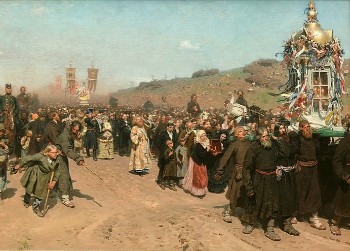The traditional Russian Easter all-night vigil service ends in the morning with a joyful procession that symbolises Jesus’ followers, the women and the disciples, going to the tomb and finding it empty. This is Rachmaninov’s setting from his All-Night Vigil of the Orthodox resurrection hymn for Easter morning. It’s a wonderful text, and there’s nothing quite like it that I know of in Western Christianity. I also like the fact that the women, who are so often sidelined, are placed firmly at the centre of the story. Rachmaninov’s setting begins шт thrilling anticipation, the butterflies in the tummy when you know something amazing is about to happen, and eventually it explodes into rapture on the words ‘Holy, Holy, Holy’ (‘Svyat, Svyat, Svyat’) , the music dances for delight and victory and bells ring out in the tumbling Alleluias. Rachmaninov quotes from this last section at the end of his Symphonic Dances, where it comes charging in to defeat the ‘Dies Irae’ funeral chant.
I’ve included a bonus track today, adding the next movement, and there’s a translation of the texts below the videos. This recording by the Estonian Chamber Choir is by far and away my favourite recording of the All-Night Vigil – and a performance by the Latvian Chamber Choir at the Proms a couple of years ago was just as good – Baltic choirs have a unique combination of stunning choral skills and a deep cultural understanding of the texts.
(With apologies to my Russian friends for not waiting until Orthodox Easter)
English texts:
Blessed art Thou, O Lord. Teach me the way of Thy statutes.
The angelic hosts marvelled to see Thee amongst the dead. O Saviour, Thou hast destroyed the power of death and didst raise up Adam with Thee, so that we might all be redeemed from hell.
‘O disciples, why pour out tears of compassion onto the myrrh ye bring?’ cried the shining angel in the tomb to the Myrrhbearers. ‘Look into the tomb, and know that the Saviour is risen from the dead.’
At daybreak, the Myrrhbearers ran weeping to Thy grave, but an angel appeared unto them and said, ‘The time for sorrow is past. Do not weep, go and proclaim the resurrection to the apostles.’
The Myrrhbearers came weeping to Thy grave bringing myrrh, O Saviour. An angel spoke unto them saying, ‘Why seek ye the living among the dead? For He is God and is risen from the grave.’
Glory be to the Father, and to the Son, and to the Holy Spirit.
Let us worship the Father, and the Son, and the Holy Spirit, the Holy Three in One, and with the Seraphim, we cry to Thee, ‘Holy, Holy, Holy is the Lord.’
Now and forever, world without end. Amen.
O Virgin, thou hast borne the Giver of Life and so hast overcome the sin of Adam. Eve’s sadness hath turned to joy and the dead hath been restored to life by the God incarnate, born of thy womb.
Alleluia. Praise be to Thee, O God.
Movt 10
Having beheld Christ’s resurrection, let us worship the Holy Lord Jesus, for He alone is without sin.
O Christ, we worship Thy cross and holy resurrection in songs of everlasting praise.
Thou art our God, we have no other God but Thee and we call upon Thy name.
Come, all ye faithful, and let us worship the holy risen Christ, by whose cross joy is come to the whole world. Let us bless the Lord forever and rejoice in His resurrection, for by His suffering and death on the cross, death hath been destroyed.
(Translation (c) Durham Singers)








